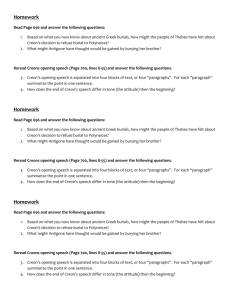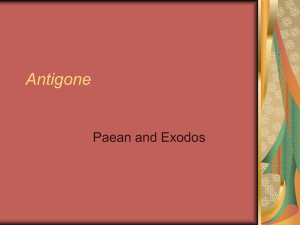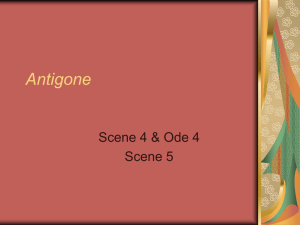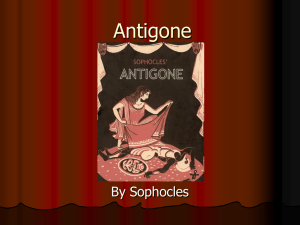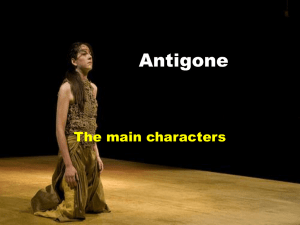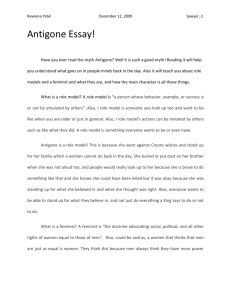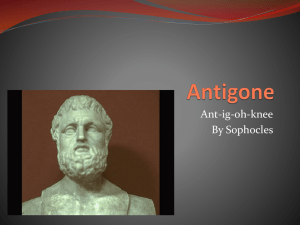Name
advertisement
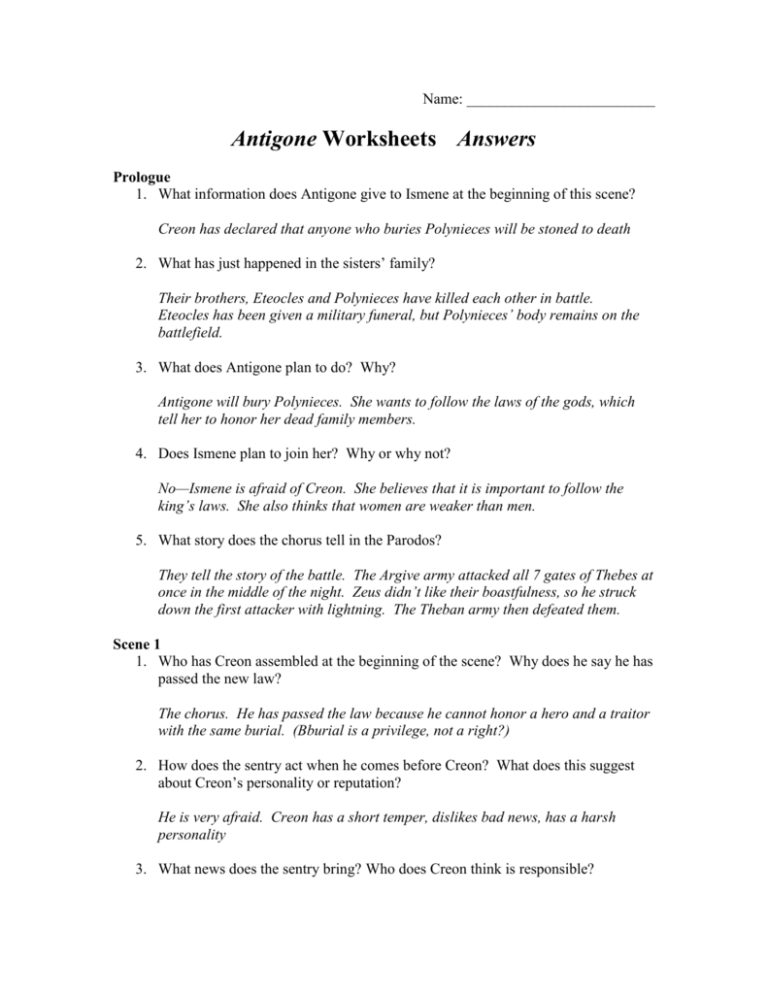
Name: _________________________ Antigone Worksheets Answers Prologue 1. What information does Antigone give to Ismene at the beginning of this scene? Creon has declared that anyone who buries Polynieces will be stoned to death 2. What has just happened in the sisters’ family? Their brothers, Eteocles and Polynieces have killed each other in battle. Eteocles has been given a military funeral, but Polynieces’ body remains on the battlefield. 3. What does Antigone plan to do? Why? Antigone will bury Polynieces. She wants to follow the laws of the gods, which tell her to honor her dead family members. 4. Does Ismene plan to join her? Why or why not? No—Ismene is afraid of Creon. She believes that it is important to follow the king’s laws. She also thinks that women are weaker than men. 5. What story does the chorus tell in the Parodos? They tell the story of the battle. The Argive army attacked all 7 gates of Thebes at once in the middle of the night. Zeus didn’t like their boastfulness, so he struck down the first attacker with lightning. The Theban army then defeated them. Scene 1 1. Who has Creon assembled at the beginning of the scene? Why does he say he has passed the new law? The chorus. He has passed the law because he cannot honor a hero and a traitor with the same burial. (Bburial is a privilege, not a right?) 2. How does the sentry act when he comes before Creon? What does this suggest about Creon’s personality or reputation? He is very afraid. Creon has a short temper, dislikes bad news, has a harsh personality 3. What news does the sentry bring? Who does Creon think is responsible? The sentry tells him that someone has sprinkled dust on Polynieces’ body. Creon suspects a man, an anarchist, may have bribed Creon’s guards to do this. 4. What is the dramatic irony in this scene? We know that Antigone has buried Polynieces, but Creon, the Chorus, and the Sentry do not know. Scene 2 1. Who does the sentry bring before Creon? How has the culprit been caught? The sentry brings Antigone. The guards uncovered the body and waited for someone to come. Antigone came to rebury the body and was captured. She did not deny it. 2. What is Antigone’s attitude toward death? She does not fear it. It would be better than the suffering she has gone through. 3. Whom else does Creon want to question? Ismene 4. What has he decided to do with the sisters? He has the guards take them away and keep an eye on them in case they try to escape. Antigone will be killed. Scene 3 1. Who has come to speak with Creon? Haemon, his son and Antigone’s fiancé 2. What does Creon say is the greatest evil that society faces? (hint: lines 33-44) Anarchy 3. What does Haemon ask Creon to do? He asks him not to be stubborn, to listen and be moved to free Antigone. 4. What is Creon’s response? He accuses Haemon of being immature and “whipped” for Antigone; he has “sold out to a woman” 5. Haemon says in line 119: “Then she must die. But her death will cause another.” What does Haemon mean? What does Creon think he means? Haemon means that he will kill himself if Creon kills Antigone. Creon thinks that Haemon means that he will kill Creon. 6. How has Haemon’s tone/attitude toward Creon changed from the beginning to end of scene 3? At the beginning, he was respectful and trying to flatter Creon. At the end he is desperate and accuses Creon of being too stubborn and of offending the gods. 7. How will Antigone be killed? She will be sealed in a stone vault until she dies. Scene 4 1. What is the chorus’s attitude toward Antigone? How is this different from earlier in the play? The chorus feels sorry for Antigone and believes that she will receive glory after death. Earlier in the play, the chorus was firmly on Creon’s side and agreed that the criminal must be punished. 2. In lines 37-44, what feelings does Antigone express about her father? She believes that her father’s crimes have infected the family and that her misfortunes are linked to the curse of his actions. 3. What is happening at the end of scene 4? Antigone is being locked in the vault. Scene 5 1. According to Teiresias, what is the “new calamity” that Creon has brought to Thebes? (lines 25-31) Because Polynieces is not buried, the city is cursed. Dogs and birds that have eaten the body are now diseased. The gods refuse to listen the Thebans’ prayers and sacrifices. 2. In lines 48 to 61, what does Creon accuse Teiresias of wanting from him? Money 3. What does Teiresias predict for Creon in lines 70-87? What crime has Creon committed to deserve this? Creon’s house will be cursed. He will pay “corpse for corpse, flesh for flesh.” His crime is keeping Polynieces from the gods and sending Antigone to an early death. 4. What does the Choragus tell Creon that he must do to prevent this? He must free Antigone and make a tomb for Polynieces. 5. What is a Paean? A prayer, asking for assistance from the gods. In this paean, Dionysus is invoked. Exodos 1. What two people does the messenger say have died? How have they died? Antigone died by hanging herself with her veil. Haemon saw this and killed himself with his own sword. 2. By the time Creon returns, who else has died? Eurydice, his wife, has killed herself with a knife. 3. What is Creon’s attitude at the end of the play? He is repentant. He wants to kill himself, because he knows that everything that has happened is his fault alone. 4. Judging by the final speeches of the play, what do you think is Creon’s fatal flaw? Pride (or Stubbornness). He thought that he had all the answers, and wanted the final word. Others tried to persuade him that he could be wrong, but he refused to listen. He thought that his decrees were of more importance than the laws of the gods.



